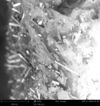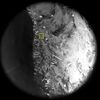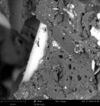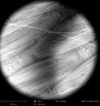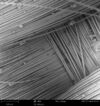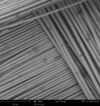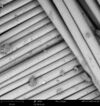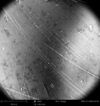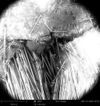Difference between revisions of "SEM Images"
From Advance Coatings Wiki
Jump to navigationJump to search| (4 intermediate revisions by the same user not shown) | |||
| Line 1: | Line 1: | ||
Images of products under high magnification. | Images of products under high magnification. | ||
| + | __TOC__ | ||
| + | |||
| + | ==Initial SEM Images== | ||
===Hull and Deck Putty=== | ===Hull and Deck Putty=== | ||
{|class="wikitable" | {|class="wikitable" | ||
| − | ! | + | !Image |
!Comment | !Comment | ||
| − | ! | + | !Zoom |
|- | |- | ||
| − | | | + | | [[File:SEM Hull and deck putty.jpg|100px|thumb||]] |
| A polyester product with embedded glass. Note the left edge, which is a broken edge of the putty. You can see glass fibers sticking out. | | A polyester product with embedded glass. Note the left edge, which is a broken edge of the putty. You can see glass fibers sticking out. | ||
| − | | | + | | 200x |
|- | |- | ||
|- | |- | ||
| − | | | + | | [[File:SEM Hull and deck putty2.jpg|100px|thumb||]] |
| Area to zoom in. | | Area to zoom in. | ||
| − | | | + | | |
|- | |- | ||
|- | |- | ||
| + | | [[File:SEM Hull and deck putty3.jpg|100px|thumb||]] | ||
| + | | Zoomed in area of previous picture. One strand of glass is visible. | ||
| 3000x | | 3000x | ||
| − | |||
| − | |||
|} | |} | ||
| − | Woven Roving | + | ===Woven Roving=== |
{|class="wikitable" | {|class="wikitable" | ||
| − | ! | + | !Image |
!Comment | !Comment | ||
| − | ! | + | !Zoom |
|- | |- | ||
| + | | [[File:SEM Woven Roving.jpg|100px|thumb||]] | ||
| + | | Threaded fiberglass. Has a checkerboard appearance. The dirt specks here may be from the glue used, or other dust. Sample should've been sprayed with air before putting under microscope. | ||
| 135x | | 135x | ||
| − | |||
| − | |||
|- | |- | ||
|- | |- | ||
| + | | [[File:SEM Woven Roving2.jpg|100px|thumb||]] | ||
| + | | | ||
| 480x | | 480x | ||
| + | |- | ||
| + | |- | ||
| + | | [[File:SEM Woven Roving3.jpg|100px|thumb||]] | ||
| | | | ||
| − | | | + | | 1000x |
|- | |- | ||
|- | |- | ||
| − | | | + | | [[File:SEM Woven Roving4.jpg|100px|thumb||]] |
| | | | ||
| − | | [[File: | + | | 3000x |
| + | |} | ||
| + | ===3210 LVP=== | ||
| + | {|class="wikitable" | ||
| + | !Image | ||
| + | !Comment | ||
| + | !Zoom | ||
| + | |- | ||
| + | | [[File:SEM_3210LVP2.jpg|100px|thumb||]] | ||
| + | | Here is a surface of 3210 in woven roving. Cured at ambient temperatures (~20C). | ||
| + | | 140x | ||
|- | |- | ||
|- | |- | ||
| − | + | | [[File:SEM_3210LVP3.jpg|100px|thumb||]] | |
| − | + | | Here is the same sample but showing the glass underneath the top layer. Because the resin was only applied over the top of the glass with a roller, and no heat or vacuum was used, the resin did not soak into the inner layers. | |
| − | | [[File: | + | |
| + | For best strength, the resin must soak to the inside. This can be resolved with (as mentioned) heating or vacuum. Note that vacuum isn't necessary to 'degas' but only to pull the resin into the inside of the glass. | ||
| + | |||
| + | Glass type: n/a | ||
| + | Resin type: 3210LVP | ||
| + | | 140x | ||
| + | |||
|} | |} | ||
Latest revision as of 16:00, 29 December 2020
Images of products under high magnification.
